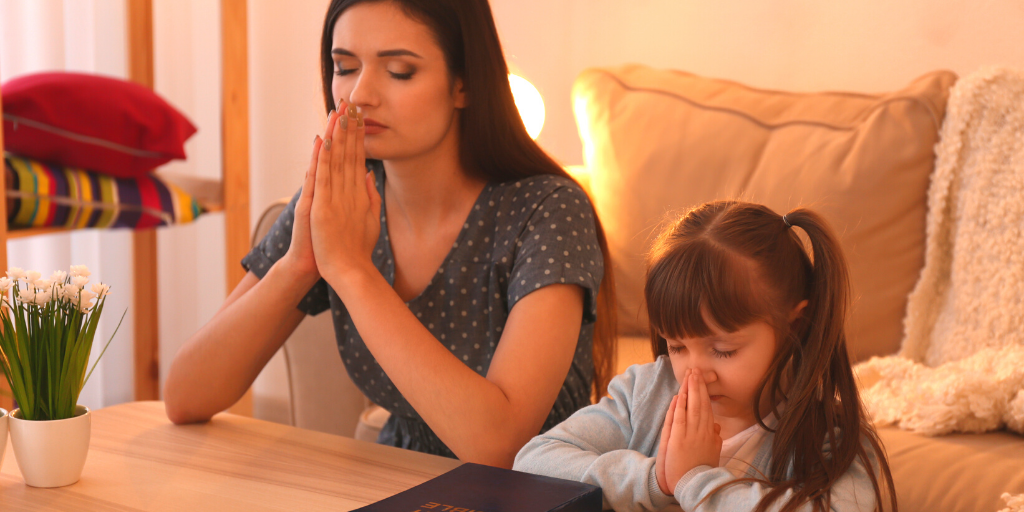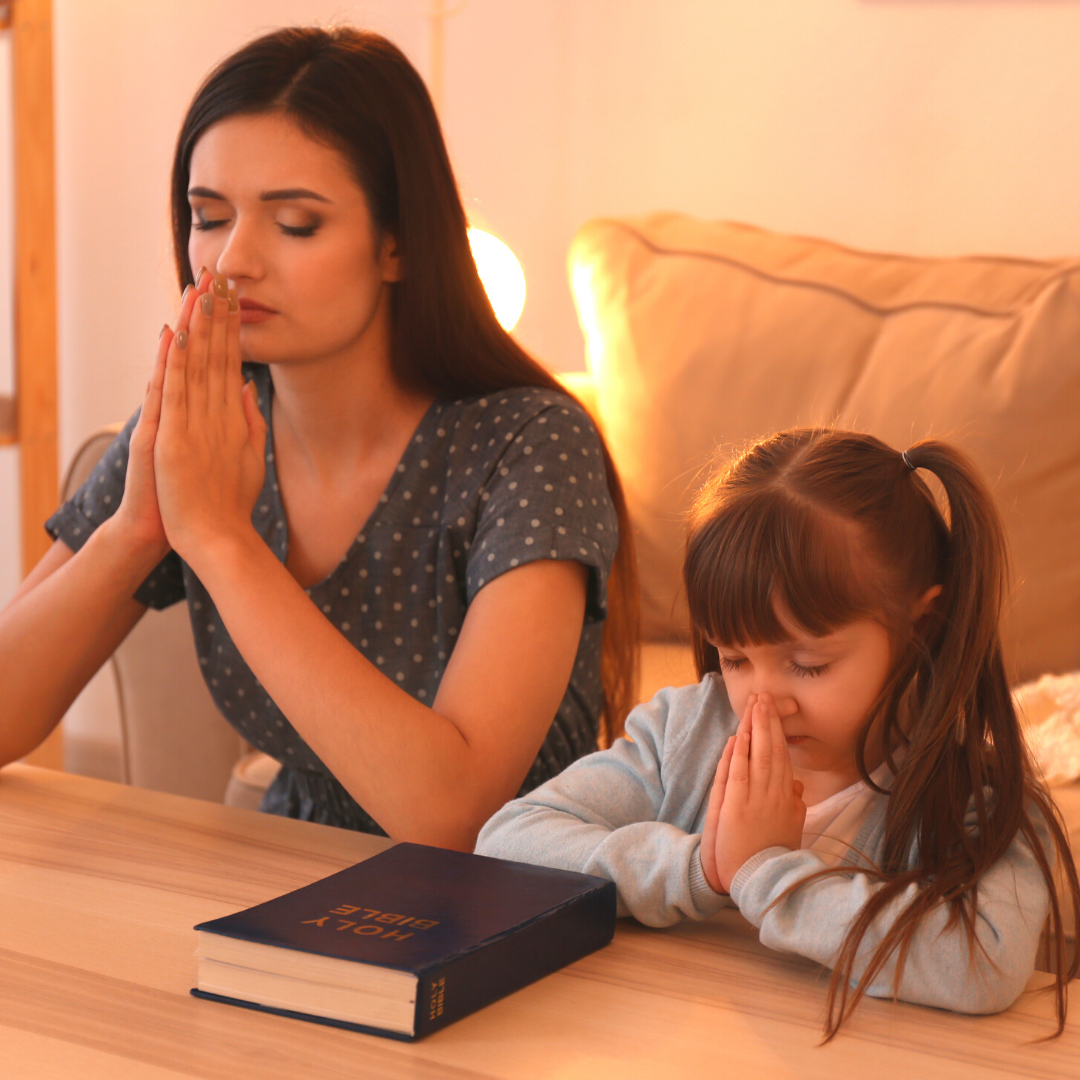
Jessica Ptomey offers three questions parents and catechists can use to evaluate whether they are cooperating with God as they teach the faith.
My last post in this Faith Formation Series explored the possibility that parents and teachers can sometimes get in the way of the Holy Spirit’s work in the hearts of children, even though that is not our intent. I introduced to us some questions that might serve as “a catechist’s examination of conscience.” In this post, I am unpacking the first three questions. As we walk through them, let’s open our hearts intentionally to the voice of the Holy Spirit.
Question 1: Do I enter into this formational work with prayer, asking for God’s will and not my own to be accomplished?
I could reference a litany of Scriptures and saints here when it comes to the principle that we should bathe every effort and action in prayer. We instinctively know this, but it is often our tendency to plunge into a class or a conversation with our own agenda firmly in place. How much better to resolve to start every movement with humble prayer, with a recollected heart that seeks God’s will to replace our own.
Proverbs 19:21 holds a lot of wisdom for us on this issue: “The human mind may devise many plans, but it is the purpose of the Lord that will be established.” We want to start with prayer because we want God’s purpose to be the one that is established in our lessons (formal or informal) with children.
I’ve often seen bumper stickers with the question: Have you prayed about it? We know it’s the reminder that we need in many areas of life, but we so often forget to pray and ask for God’s direction. We get into the habit of making plans without running them by God; and when it comes to passing on the faith to the next generation, our unchecked methods seem good to us.
What’s at risk? Scripture warns us: “There is a way that seems right to a person, but its end is the way to death” (Proverbs 14:12; Proverbs 16:25). Let’s pause there. That might seem like a heavy statement to apply to catechetical work. Surely, we might say, none of my words or methods regarding faith formation are going to lead to death! But the truth is that our posture, tone, emphasis, words, and methods—if not led by the Spirit—can often cause death in the spiritual life of a child. The stakes are high. Have we asked for God’s purpose and spirit to be establish in our words and actions?
Question 2: Am I recognizing the child as a person made by God in his image, or am I trying to remake the child into an image of myself?
We must always remember that discipleship is about making “little Christs”—not miniature versions of ourselves. We are all unique individuals, and there is great diversity in the body of Christ. Catholicism is a big tent in many ways, encompassing a great variety of cultural expressions and devotional aesthetics. Our goal should always be that children become the best version of the unique people that God made them to be, with their unique personalities, charisms and devotional relationship to the Trinity.
The children in our homes and classrooms will not have identical lives of faith to us or anyone else. There will be different gifts and different struggles; they may connect with the Lord in prayer differently than we do. Scripture passages may inspire different ideas for one person than they do for another. As a guide and friend in the journey of faith, we must keep this principle foremost in our minds. We need to ask whether we are giving our own experiences and perspective undue influence on the life of another. We must be careful not to communicate that our devotional experiences are the best to emulate. We need to walk humbly, always pointing the children toward Christ’s example. We would also do well to remember that we can learn much from these children that we don’t already know. Could it be that a child in our midst may lead us to Christ in a new way? I think that God intends that more than we realize.

Question 3: Do I treat the children God has placed under my authority with respect?
I find that culturally we don’t talk enough about respecting the personhood of the child. Of course, children are to show parents and teachers due respect, as these individuals have been deputized by God as spiritual authority figures in their lives. But the principle of treating other human beings with respect is irrespective of age and authority position. In fact, teachers and parents are under a greater obligation to demonstrate and teach respect by their own behavior toward the children in their midst. Children learn how to respect others by being treated with respect, and that respect is due them simply because they are human beings created in the image of God.
Our behavior towards them communicates whether we believe they have worth. There are various behaviors that will reveal a respectful or disrespectful attitude toward children. Do we take their questions and concerns seriously? Are we careful not to offend their sensitivities or convictions? Do we act as if their ideas are silly or uninteresting? Do we hold our place of authority over them in arbitrary ways? Ultimately, respect for children reflects whether we as parents or teachers see ourselves as under God’s authority.
We will continue to unpack the remaining questions in our “catechist’s examination of conscience” in the next post.
Copyright 2022 Jessica Ptomey
Image: Canva Pro
About the Author

Jessica Ptomey
Jessica Ptomey is a Catholic convert, author, speaker, Communications scholar, home educator, and Director of Religious Education at Sacred Heart Church in Bowie, MD. She blogs at JessicaPtomey.com. She is the author of Home in the Church: Living an Embodied Catholic Faith, and her research in inter-faith dialogue has been published in the Journal of Communication and Religion (JCR). She is also the co-host with her husband Mike of The Catholic Reading Challenge podcast.


.png?width=1806&height=731&name=CatholicMom_hcfm_logo1_pos_871c_2728c%20(002).png)
Comments